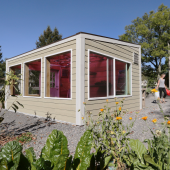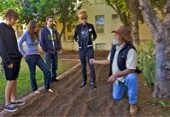
This case study describes a student-led campus sustainability initiative to design and implement a power-generating greenhouse at Allegheny College. The design of the greenhouse was carried out by students in collaboration with professionals in a variety of learning settings including research seminars, independent studies, paid internships, and senior thesis projects. By providing a detailed account of the student-driven design process and structuring the analysis around a framework of documented sustainability competencies, this paper identifies challenges and opportunities for utilizing living labs for sustainability education. Researchers observed that students who contributed to greenhouse development in multiple capacities developed several sustainable competencies. The project also demonstrates the difficulty of engaging students in both the planning and implementation stages of multi-year efforts. While the student-led design process introduced new logistical challenges, deep levels of student commitment and unique student backgrounds were critical to the greenhouse project’s success.
Continue Reading
Abstract: Since Michael Crow, President of Arizona State University, founded the School of Sustainability in 2006, sustainability has become a central focus at the University. ASU offers both undergraduate and graduate degrees in sustainability, from Bachelor’s degree to Ph.D. level. The author, the Dean of the School of Sustainability at ASU, discusses how the University’s programs foster hope and agency among students and prepare them to address the pressing challenges of living and working sustainably. The author focuses primarily on curricular strategies and also addresses some extra-curricular strategies employed at ASU. He also discusses post-graduate employment patterns of alumni who have built upon their educational experience at ASU to become agents advancing sustainability in their work.
Continue ReadingAchieving a sustainable future requires that individuals adopt different values, attitudes, habits, and behaviors, which are often learned and cemented at a young age. Unfortunately, current educational efforts are inadequate for achieving transformative action. Even programs whose primary goal is to promote responsible, pro-environmental behaviors have largely failed at creating change among students. The lack […]
Continue Reading